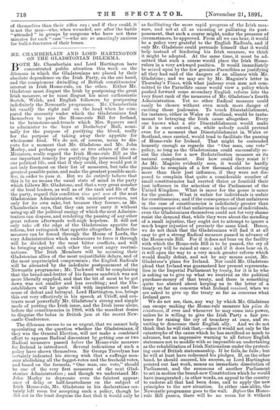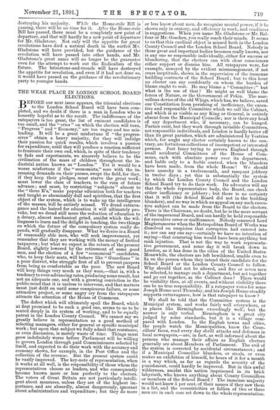MR. CHAMBERLAIN AND LORD HARTINGTON ON THE GLADSTONIAN DILEMMA. B OTH
Mr. Chamberlain and Lord Hartington have concentrated public attention this week on the dilemma in which the Gladstonians are placed by their absolute dependence on the Irish Party, on the one hand, and the conspicuous dwindling of British constituencies' interest in Irish Home-rule, on the other. Either Mr. Gladstone must disgust the Irish by postponing the great Irish measure, or he must disgust his most enthusiastic Scotch, Welsh, and English followers by postponing indefinitely the Newcastle programme. Mr. Chamberlain hit exactly the right nail on the head when he com- pared the necessity under which the Gladstonians find themselves to pass the Home-rule Bill for Ireland, to the brimstone-and-treacle which Mrs. Squeers used to administer to the boys at Dotheboys' Hall, nomi- nally for the purpose of purifying the blood, really for the purpose of taking away their appetite for wholesome food. We do not, of course, mean to dis- pute for a moment that Mr. Gladstone and Mr. John Morley, and perhaps even one or two others of the ex- Ministers, really regard the Irish Home-rule Bill as the one important remedy for purifying the poisoned blood of our political life, and that if they could, they would put it not only foremost on their list of measures, but take the greatest possible pains, and make the greatest possible sacri- fice, in order to pass it. But we do entirely believe that this is by no means the usual state of mind in the party which follows Mr. Gladstone, and that a very great number of the local leaders, as well as of the rank and file of the the party, regard this condition sine qud non of the next Gladstonian °Administration with unmixed aversion, not only for its own sake, but because they foresee, as Mr. Chamberlain says, that they can never carry it without using up all the political energy of which the next Adminis- tration can dispose, and rendering the passing of any other great reform afterwards well-nigh hopeless. It will not only take off the edge of the Gladstonian appetite for reform, but extinguish that appetite altogether. Before the measure can be forced through the House of Lords, the very Administration which endeavours to force it through will be divided by the most bitter conflicts, and will be bringing against each other the most angry recrimi- nations. The Irish Members will be accusing their Gladstonian allies of the most unjustifiable delays, and of the most unprincipled compromises ; the English Radicals will be alienated by the indefinite postponement of the Newcastle programme ; Mr. Tuckwell will be complaining that the bread-and-butter of his famous sandwich was not more liberally supplied, and that the bit of meat to be got down was not smaller and less revolting; and the Dis- establishers will be quite wild with impatience and the sense of defeat and betrayal. Lord Hartington, too, brings this out very effectively in his speech at Crieff, and con- trasts most powerfully Mr. Gladstone's strong and simple mode of putting the Irish issue, and the Irish issue alone, before the constituencies in 1886, with the manifest desire to disguise the bolus in British jam at the recent New- castle Conference.
The dilemma seems to us so urgent, that we cannot help speculating on the question whether the Gladstonians, if they win the General Election, will not make a combined effort to appease Radical discontent by getting one or two Radical measures passed before the Home-rule measure for Ireland is introduced. Several indications of such a policy have shown themselves. Sir George Trevelyan has certainly indicated his strong wish that a suffrage mea- sure abolishing all the faggot-votes and the freehold votes, and based on the formula, " One man, one vote," should be one of the very first measures of the next Glad- stonian Administration ; and though we understand Mr.
John Morley to deprecate even the faintest appear- ance of delay or half-heartedness on the subject of Irish Home-rule, Mr. Gladstone in his declarations cer- tainly left room for accepting such a policy, though he did not in the least disguise the fact that it would only be as facilitatinc, the more rapid progress of the Irish mea- sure, and not at all as excusing or palliating its post- ponement, that such a course might, under the pressure of circumstances, be approved. From all we can hear, it would be a policy very grateful to the English Radicals, and if only Mr. Gladstone could persuade himself that it would help instead of hindering his Irish measure, we think it might be adopted. At the same time, it must be ad- mitted that such a course would place the Irish Home- rulers in a very awkward position. It would immediately be seized upon by the few genuine Parnellites as justifying all they had said of the dangers of an alliance with Mr. Gladstone; and we may see by Mr. Maguire's letter in Thursday's Times, with what jealousy even men not com- mitted to the Parnellite cause would view a policy which pushed forward some secondary English reform into the very front rank of the measures of Mr. Gladstone's fourth Administration. Yet no other Radical measure could easily be chosen without even much more danger of exciting those jealousies. To touch Disestablishment, for instance, either in Wales or Scotland, would be tanta- mount to betraying the Irish cause altogether. Every one knows what a stir Disestablishment would make if it is once entered on, while nobody could pretend even for a moment that Disestablishment in. Wales or Scotland, once carried, would tend to facilitate the passing of Home-rule for Ireland. That might be contended honestly enough as regards the " One man, one vote" policy, so long as the Gladstonians could successfully re- sist the claim for a new Redistribution measure as its natural complement. But how could they resist it ? As Mr. Maguire evidently sees, it would be hardly possible to complain of a few thousand electors having more than their just influence, if they were not dis- posed to complain that quite a considerable number of small constituencies had exerted thrice or fourfold their just influence in the selection of the Parliament of the United Kingdom. What is sauce for the goose is sauce for the gander. What is unfair for individuals is unfair for constituencies; and if the consequence of that unfairness in the case of constituencies is indefinitely greater than the consequence of that unfairness in the case of individuals, even the Gladstonians themselves could not for very shame resist the demand that, while they were about the mending of a small injustice, they ought not to attempt to ignore a much huger injustice of precisely the same kind. Hence, we do not think That the Gladstonians will find it at all easy to get a strong Radical measure passed in advance of the Home-rule Bill. For if it does not bear on the facility with which the Home-rule Bill is to be passed, the cry of treachery will be raised at once ; and if it does bear on it, it will open the way to a very much greater reform which would finally defeat, and not by any means assist, Mr. Gladstone's plans for Ireland. Nor could Mr. Gladstone plead that Ireland was guaranteed her present representa- tion in the Imperial Parliament by treaty, for it is he who is asking us to give up what we received as the political purchase-money of that treaty, and there is something quite too absurd about keeping us to the letter of a treaty so far as concerns what Ireland received, when we are asked to give up the treaty so fax as concerns what Ireland gave.
We do not see, then, any way by which Mr. Gladstone can escape making the Home-rule measure his piece de resistance, if ever and whenever he may come into power, unless he is willing to give the Irish Party a fair pre- tence for raising the cry of treachery at once, and re- uniting to denounce their English ally. And we do not think that he will risk that,—since it would not only be the catastrophe of the cause which he has sacrificed so much to advance, but an impressive warning to all future English statesmen not to meddle with so impossible an undertaking as the rehabilitation of Irish Nationalism under the protect- ing care of British statesmanship. If he fails, he fails ; but he will at least have redeemed his pledges. If, on the other hand, he should succeed, his success, as Lord Hartington pointed out last week, means an immediate dissolution of Parliament, and the summons of another Parliament to set in motion the brand-new Constitution which be would have inaugurated ; in other words, an appeal to the country to endorse all that had been done, and to apply the new principles to the new situation. In either case alike, the Newcastle programme goes to the wall. Before the Home- rule Bill passes, there will be no room for it without destroying his majority. While the Home-rule Bill is passing, there will be no time for it. After the Home-rule Bill has passed, there must be a completely new point of departure, and that will hardly be a new point of departure for Mr. Gladstone. Not only will the appetite for great revolutions have died a natural death in the surfeit Mr. Gladstone will have provided, but the guidance of the revolution will have passed into other hands, and Mr. Gladstone's great name will no longer be the guarantee even for the attempt to work out the Radicalism of the future. The brimstone-and-treacle will have destroyed the appetite for revolution, and even if it had not done so, it would have passed on the guidance of the revolutionary party to younger hands.



















































 Previous page
Previous page